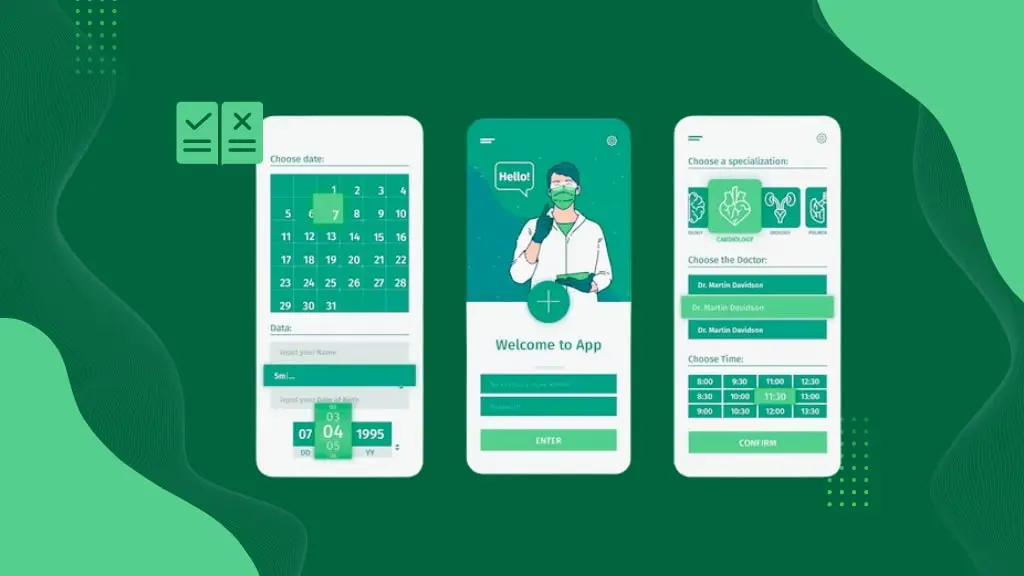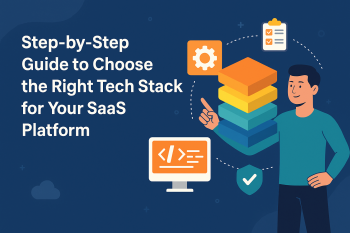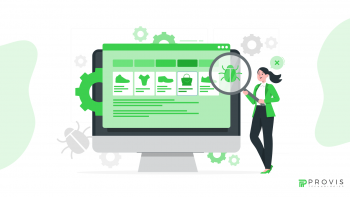In 2024, the global healthcare mobile app market is expected to reach $111.1 billion, which will drive the importance of good app design that prioritizes user-friendliness, accessibility, and data security.
Healthcare-related applications are diverse, and some of them include appointment booking, remote doctor visits, teaching applications, and medication management, among others.
However, the development of a healthcare mobile app is not a piece of cake. It requires a good knowledge of the desires of users, their unwillingness to listen, and what rules dictate. The app must be functional, easy to interact with, fully secure, and conform to the regulations set down by the healthcare industry.
In this post, you are going to learn the essential steps that will assist you in developing practical healthcare mobile applications. That is where we shall discuss measures to enhance the usability of the product or service, ways of ensuring the security of the product and service, measures to ensure compliance with the set standards, and measures to ensure availability to all users.
Why are Healthcare mobile apps important?
Healthcare is unique because it deals with personal information, and many times, decisions made could be the difference between life and death. Thus, any design of a healthcare app has to consider the issues of trust, data protection, and simplicity. A healthcare app with good design can:
- Boost Patient Involvement: In this respect, a well-designed app can contribute to the rise of patients’ engagement by providing easy and fast access to their medical information, options for scheduling appointments, or possibilities to communicate with the healthcare staff.
- Better Healthcare Services: Healthcare workers can examine the patient’s files and schedules and even provide advice from a distance with the help of mobile apps, which enhances healthcare quality.
- Follow Rules: Healthcare laws such as HIPAA in the United States of America have to be adhered to to prevent the leakage of information that violates the patient’s rights and to control the instances of legal actions taken against the healthcare organization.
- Build Trust: Thus, an easy-to-use and safe app design can go a long way in building the confidence of the patient with the healthcare app and service provider.
What are the essential guidelines for Healthcare mobile app design?
There are many things involved in the procedure of a healthcare mobile app development, from how users interact with the application to basic health rules.
Design for Users
Designing with the users as the focus has a lot of effects on creating a good healthcare app that would suit the patient, doctor, and managers. To do this, an app that is easily understood, simple to use, and meets the needs of its users must be developed.
- Get to Know Your Users: Conduct some form of research so that you can identify the wants, preferences, and challenges that your audience has.
Create generic users, such as patients, doctors, and nurses, and then develop the app to suit the various needs of the users.
- Make Navigation Easier: Develop a friendly UI and such things as menus and features for using the application should be reachable.
Avoid the use of confusing icons and buttons when designing, thus making it easier for the users to learn how to move through the different areas of the app.
- Let Users Customize: Allow the users to decide what type of alert they would like to receive and other specifications about the use of the app.
Introduce the algorithm basics of recommendations related to the user’s interactions and data in the field of health.
Secure, Protect, Private
Data confidentiality and protection are equally important while you develop a health app. These applications possess personal data, including medical history, prescription history, and financial data. Therefore, more efforts have to be made to ensure that user-sensitive data is secure from outside influence.
- Follow Healthcare Rules: Remember to conform to the applicable set of medical laws for your app, such as HIPAA for American applications, GDPR for European applications, or any other if operating in different regions. It is recommended that encrypted safe login procedures be used and security tests conducted from time to time to be compliant.
- Use Strong Authentication: Request strict authentication procedures. This includes checking fingerprints or faces in the two-factor authentication (2FA), besides using secure passwords to prevent unauthorized access. Allow users to sign in from secure manners such as OAuth (Open Authorization) to enhance security.
- Use Data Encryption: Encrypt it when it is the point of storing the data and also when transporting it to prevent it from being accessed by third parties. Do not transmit data in the clear between the app and servers, but rather encrypted connections such as HTTPS.
Don’t Miss: The Step-by-Step Guide to E-Learning Software Development
Make Accessibility a Priority
Every person should be able to use the healthcare mobile app design, including the disabled and physically challenged. The openness of apps is not just a legal mandate in many areas; it is necessary to guarantee that everybody can incorporate all the elements of the application.
Follow Accessibility Guidelines: Stay on the rules through the Web Content Accessibility Guidelines (WCAG) and the Americans with Disabilities Act (ADA) so that your app will be effective for people with disabilities. Let people switch between different font sizes and contrast modes and use screen readers for those who have some vision difficulties.
Support Multiple Languages: Expand the ability to write in different languages so that as many people can use the given software as possible. Ensure that translations are correct and cultural to prevent users from complaining that what they have received is different from what they wanted.
Make Data Entry Simple
Smart healthcare apps sometimes require users to input information such as symptoms, the time taken for medication, or health status. The ease of inputting correct data is quite essential to enable users to feed the system with all the necessary information.
- Keep Forms Basic: Design printed and online forms with easily understood labels and organize the completion process to direct users through the various fields to be completed and reduce the number of mandatory fields for registration to make it easier for users and to decrease the number of mistakes.
- Add Voice Entry: Consider also providing voice entry options mainly for people with impairments or with difficulties in handling their limbs. Test that voice entry is smooth and lets users know when it is ready to accept input or when to speak.
Must Know: Cloud-Based Application Development: A Step-by-Step Guide
Easy communication and teamwork
All your apps should enable all the users to talk and work with or for each other seamlessly. This particular healthcare mobile app design is beneficial.
- Include Messaging and Video Calls: Include call and messaging functionality to allow the patient to speak with doctors and care from the safety of home. It is essential that all chats should be encrypted and should adhere to the healthcare rules for patients’ data protection.
- Send alerts and reminders: To notify the users about the visits and when to take medicine and other critical health-related tasks, set up push alerts and reminders to be sent. Allow users to edit their alert preferences so that they can receive a few persistent notifications.
Strong Analytics and Reporting
Data analytics and reporting tools are some of the essential components of a healthcare application project. They provide valuable information regarding how the users behave, how effective the app is, and the health outcomes that stem from the same.
- Watch Your Figures: Insert features to monitor such parameters as how intensively people employ the app and how and what changes in health they observe. I will make use of this info to look for methods on how the app can be improved and made to work more.
- Give Personal Reports: Provide users with personal health reports that have been prepared for them. These should summarize their info and inform them about their health. Ensure that users can obtain what the reports convey.
Also Read: Custom Education App Development: Cost & Features
Find Out the Level of Difficulty and Swiftness to Operate
Thorough testing is central to asserting that your healthcare application project functions as intended and that the customers are satisfied. You should perform usability and performance testing through the development process to identify issues.
- Test with Users: Show the app to honest users to know how it looks from a user interface perspective, how easy it is to interact with, and what it can do. With that, take what you have learned to construct what is necessary to improve the app for the overall users.
- Check App Performance: Test the app with various devices and systems and check to see how it loads and functions on all of them. Since users need to stay on an app for video calls and get data, make it performant and quick for the said tasks.
The user’s route
It is essential to ensure that all the phases are seamless from the point the person gets the app to the point he attains the health targets.
- Trace Out The User’s Journey: Create a mental map of the user, highlighting those areas where he spends most of his time and the areas that can pose a significant problem. Develop a health app that would guide the user through all segments of his path, providing him with tips and tools when required.
- Improve the start-up process: Make their introduction gentle so users get to know about the app and how they can use and enjoy its features. You can easily use guides, pop-up tips, and step-by-step touring to explain to the users how the application functions and what it’s capable of doing.
Related Blog: A Step-by-Step Guide for FinTech App Design With Expert Tips
Conclusion
As it has become apparent in other industries, including the healthcare industry, it has become somewhat obligatory to fulfill the market needs to be able to taste success. Every clinic and hospital, therefore, has to develop a robust healthcare application to tackle patients competently and efficiently.
Outsource the project to a reliable health, medical, and treatment app development company in India, like Provis Technologies, which offers complete cycle app development services. Our team of web developers and designers ensures the customer gets the best healthcare app that complies with HIPAA and has a secure database and friendly interfaces.
So, don’t wait anymore. Contact us today to get a customized, powerful mobile app for your hospital that you can grow with.
Written By
Author's Picks
- Top 10 Mobile Usability Issues and Solutions to Fix Them
- 22/08/2024
- How To Build A Minimal Viable Product (MVP) And Raise Funding In 2025?
- 28/10/2024
- How to Build a Sports Streaming App Like Sportsurge in 2025?
- 05/11/2024
Categories
- AI for Startups
- AI in Web Development
- AI Integration
- AI Platforms
- AI Prompt
- AI Tools
- AI Trading Software
- Android App
- Android vs iOS Development
- Angular
- API
- API Development
- App
- app development
- App Idea
- App User Feedback
- Application
- Artificial Intelligence
- Audit Services
- Automotive Industry
- Awards and Recognition
- Business Consulting
- Business Website
- Chatbots
- CRM
- CRM for Financial Advisors
- Custom CRM
- Custom SaaS
- Custom Website
- Customer Service
- dashboard design
- Developing a Mobile App
- Digital Business
- E-commerce
- EMR Integration
- Finance
- Financial Advisors
- Financial Advisors
- GIT
- Health Insurance
- iOS App
- iOS App Development
- IoT Mobile App Development
- IoT Platforms
- IT Audit Services
- IT Consulting
- IT Strategies
- Java Development
- Laravel
- Lean Canvas
- Learning Management System
- Logistics Apps
- Mobile App Development
- MVP
- Native App
- News Aggregator Site
- OTT
- Outsourcing IT
- Payment Gateway
- predictive analysis
- Product Launch Strategy
- Progressive Web App (PWA)
- Prototype
- Recommender Systems
- Ruby
- SaaS
- SaaS Application
- SaaS Business
- SaaS Company
- SaaS Development
- SaaS Product
- SaaS Project
- Sales Funnel
- SEO
- Shopping Cart
- Software Development
- SSL and TLS
- Startup Checklist
- Technology
- Tetradic Color Scheme
- UI/UX Design Company
- Unit Testing
- User Flow
- User Testing
- Web Development
- Web Performance Optimization
- website Maintenance Services
- Website Migration Service
- Website Speed Optimization
- WooCommerce
- WordPress





